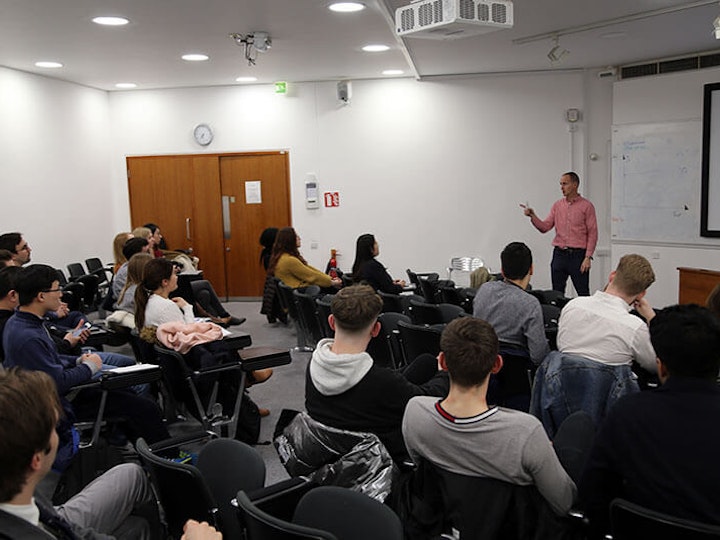Industry Insights - Leadership and Performance Under Pressure with Matthew Whitfield
Matthew Whitfield joined us at the ICMA Centre on the 12 February 2020 to discuss how to perform under pressure and talk about leadership.

Leadership and Performance Under Pressure
Matthew brought us through his incredible career as Naval Fighter Pilot, Instructor at the UK “Top Gun” School, and Head of Flying training for MI5. Matthew is now a Leadership Coach and speaker, working for MDs, CEOs and their executive teams, such as the Bank of England. As Naval Fighter Pilot, Matthew knows how to deliver under huge stress and pressure and has shown high resilience by learning from mistakes and communicating well with his team. He used his experience to train and inspire ICMA Centre students to work well in similar circumstances.
To explain how to improve our leadership skills, Matthew based his explanation on five key words:
- Intelligence
- Trustworthiness
- Humaneness
- Courage
- Discipline
These five aspects are rarely present in one person, but well-known and important leaders have at least two and work to get those they don’t possess.
Matthew explained that trustworthiness assumes that we trust ourselves because you can’t ask people to trust you if you don’t trust yourself first. Trust is the base of everything and can be improved by looking back and learning from your mistakes. Preparing yourself before can also help you be more confident and trust yourself. For example, Matthew came an hour before the start of the event to prepare the room and make sure he was ready for any issue that could appear during the talk! Once you are ready to trust yourself, you can start building trust with your colleagues at work or friends. When you will face a tricky and stressful situation, the only person you will ask for help are the people you trust because you know they would do their best to get the work done.
Another key aspect Matthew showed us is the discipline. Having a good discipline will help you be organised and therefore waste less time doing unnecessary tasks. Discipline is achieving something simple in the most effective way.
Matthew also emphasized the importance of humanness in a work environment. Strongly linked to trust, humanness with human contact as simple as saying hello, can really help build trust in a relationship with your colleague for example. This is unfortunately an element that disappears nowadays in certain office because of the use of emails and text messages when it is not necessarily needed and could be replaced by a simple discussion.
During the Q&A session, Matthew answered several questions from the attendance. Some of these questions asked about techniques to deal with a stressful situation or on how to react after a failure. He stressed the importance of anticipation and preparation for pressure by practicing before by working out of your comfort zone. He explained that if you know your objectives and your direction, it will be easier to react when facing a stressful situation.
Matthew shared with us a true story of trust, resilience, fulfilling our ambitions, and the mind set for elite team performance. The ICMA Centre and the University of Reading Finance Society are extremely grateful for Matthew Whitfield’s time in joining us for an insightful and engaging session.
Laurent Archaud - Event Manager, Finance Society
